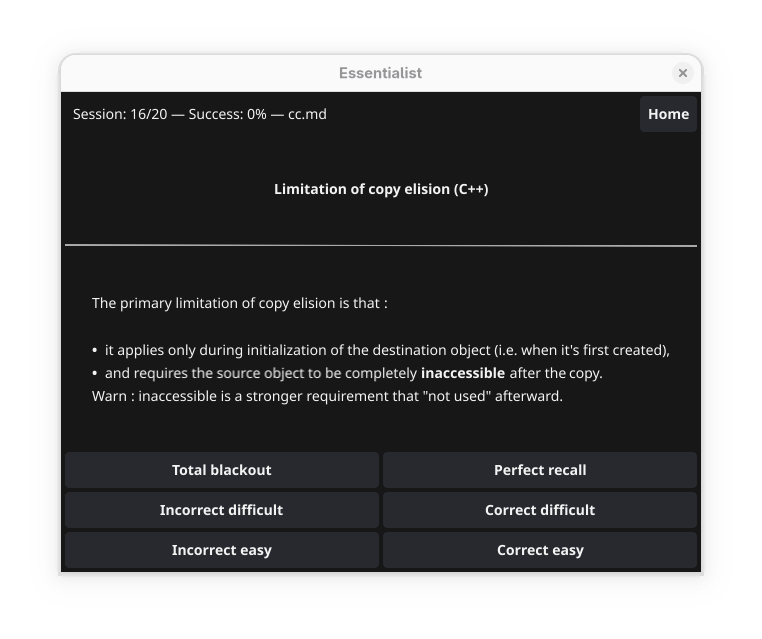Essentialist is a minimalist, private, and cross-platform flashcard app designed for fluid studying and note-taking in Markdown. 🧠 It is an open-source program for spaced repetition (similar to Anki).
Download the latest version.


Create Flashcards from Notes
Tired of creating flashcards in a separate app after taking notes? Essentialist
makes it easy. Your flashcard decks are just simple Markdown files, which means
you can create cards directly while taking notes. This is a perfect workflow
for students and anyone who takes notes and wants to quickly turn them into
study material. Each card is defined by a simple H2 header (## Your Card Title).
Because your decks are plain text files, they are:
- Easy to manage: You can organize them with any file manager.
- Future-proof: Plain text is a universal format.
- Editable with any editor: Use your favorite text editor to make changes.
Essentialist supports a variety of Markdown features, including lists, tables, emojis, and basic text styling (italic and bold). Please note that image support is not yet available.
Privacy and Simplicity at the Core
We believe your data should stay yours. Essentialist doesn’t perform any network operations. It respects your privacy by keeping your data right where it belongs: on your device. There’s no cloud, no sync service, and no data collection.
The app features a minimalist user interface that’s distraction-free and helps you focus on your learning. It includes a dark theme for comfortable late-night study sessions and robust keyboard bindings for quick navigation and interaction. For those who prefer the command line, there’s also a companion terminal application.
Learn Anywhere, On Any Device
Whether you’re on your laptop, desktop, or phone, Essentialist has you covered. It’s not just for Linux; it’s also available on Windows, macOS, and Android, allowing you to study and review your flashcards in different environments without being locked into a single platform.
The space repetition algorithm used is based on SM-2.
Flash card syntax
Each deck of cards is a plain text Markdown file with the extension .md
(ex: sample.md). You can put all your decks in the same directory.
Each card starts with a heading level 2 (line starting with ##) defining the
question. The answer is the content following (until the next heading level 2).
Your progress is stored in a hidden file .<deck file>.db (ex:
.sample.md.db).
Example of a deck with 3 cards:
## Question: what format is used?
Questions and answers are in **Markdown**.
## Are lists supported?
Yes, here is an example:
- three
- two
- **one**
- :rocket:
## How to include a table in the answer?
Answer with a table.
| A | B |
| --- | --- |
| 124 | 456 |
Reporting Issues
If you find a bug or have a feature request, please open an issue on our GitHub repository.